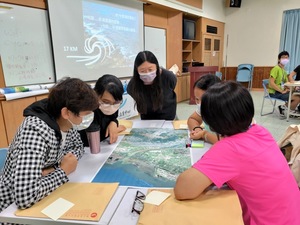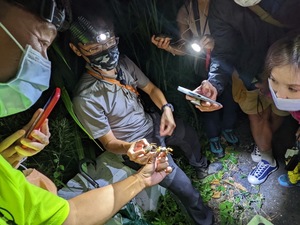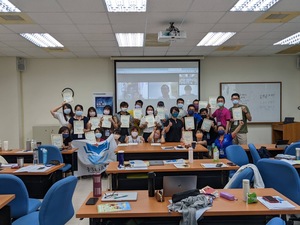Blue Level (Advanced) Marine Educator Training Program




Project Assistant:CHANG,WEI-LUN
The 2022–2026 Marine Education Implementation Plan published by the Ministry of Education in December 2021 requires the universal integration of climate change in curricula because of its close association with the ocean. Therefore, climate change was chosen as the theme for the 2022 Blue Level (Advanced) Marine Educator Training Program, which was held at the Chengching Lakefront Resort and the National Museum of Marine Biology and Aquarium between August 1 and 5, 2022.
The program incorporated the teaching resources of the two sites to educate the attending trainees on scientific and social phenomena, such as the effects of climate change on shorelines, transitions pertaining to fishery resources, coral bleaching, and restoration, thereby guiding the trainees to reflect on future possibilities. The program also expanded the trainees’ knowledge of the ocean by introducing them to foraminifera, which are essential to paleoclimatological research, and seagrass beds, which form ecosystems that are crucial for the Blue Carbon Initiative. A night expedition to observe land crabs and a tour of the Waters of the World exhibition at the National Museum of Marine Biology and Aquarium were also conducted to familiarize the trainees with the effects of climate change on various organisms.
After learning about the relationships between climate change and the ocean through various marine topics, the trainees attended technical courses that covered topics such as the development of tabletop games and the demonstration of ocean acidification in class. To facilitate exchanges between trainees, each trainee was required to introduce themselves and their marine education experience to fellow trainees. With a clear understanding of each other’s teaching resources, the trainees became more open to engaging in cross-domain and cross-level cooperation when they were brainstorming methods for teaching the relationship between climate change and the ocean.
Given the ongoing COVID-19 pandemic and the fact that the trainees had to spent 5 days together, the training program can be regarded as a success. We look forward to their active participation in promoting marine education and in demonstrating the key role of the ocean in climate change and our lives. Their works will become the basis for lesson plans, which will be made available to people who are interested in marine education.

